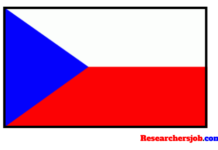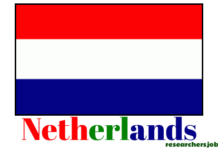Designation/Position- Ph.D. Admission in IIT Patna
Indian Institute of Technology, Patna, India invites application for Ph.D. Admission in IIT Patna from eligible and interested candidates
About- Indian Institute of Technology Patna is an autonomous institute of education and research in science, engineering and technology located in Patna, India. It is recognized as an Institute of National Importance by the Government of India. Ph.D. Admission in IIT Patna
Research/Job Area- Various
More Opportunities:
Postdoc Research Fellow Position at University of Queensland, Australia
Postdoctoral Position at IIT Ropar -Last Date – 13 November…
RA/SRF/JRF Position in IIT Indore, Madhya Pradesh, India
Postdoc Researcher Recruitment at Seoul National University, South Korea
Victoria Doctoral Scholarships at Victoria University of Wellington, New Zealand
The Smithsonian Institution Fellowship Program (SIFP) in USA
Research Associate/Research Fellow at University of Nottingham, UK
Killam Postdoctoral Research Fellowships – 2020 in Canadian universities
Location- Patna, Bihar
Eligibility/Qualification–
In all the disciplines, the upper age limit is 28 years (B.Tech./B.E./M.Sc./MA/MCA/MBA) and 32 years (M.Tech./M.E./M.S./M.Phil.) to be calculated as on the last date of application and is applicable only for candidates applying in Regular and Full time category, as institute fellow. For Research/ project fellows, age limit will be as per the funding agency norms. In absence of any age criteria, the Institute norms will be followed.Upper age limit is relaxed up to 05 years in case of candidate belonging to Schedule Castes/Schedule Tribes, Women, Physically Handicapped and OBC applicants.
- A.1 PhD in Engineering
- For admission to the PhD Programme in Engineering Department, a candidate must satisfy one of the following criteria:
- A.1.1 Candidates having M.Tech./M.E. degree in a Engineering/Technology, with a minimum CPI of 6.5 or 60% of marks.
- A.1.2 Bachelor’s degree in Engineering/Technology (from any Institute other than IITs) in a relevant area with a minimum CPI of 8.0 or 75% of marks.
- A.1.3. Bachelor’s degree from an Indian Institute of Technology (IIT) in a relevant area with a minimum CPI of 7.0.
- A.1.4. Master’s degree in Science in a relevant area with a minimum CPI of 7.5 or 70%.
- For admission to the PhD Programme in Engineering Department, a candidate must satisfy one of the following criteria:
- A.2 PhD in Science
- For admission to the PhD Programme in Science departments, a candidate must satisfy one of the following criteria:
- A.2.1 M.Phil.or Master’s degree in Science in a relevant area with a minimum CPI of 6.5 or 60% of marks.
- A.2.2 Master’s degree in Engineering/Technology in a relevant area with a minimum CPI of 6.5 or 60% of marks
- A.2.3 Bachelor’s degree in Engineering/Technology from an Indian Institute of Technology (IIT) in a relevant area with a minimum CPI of 7.0.
- A.2.4 Bachelor’s degree in a related area in Engineering/Technology (from any Institute other than IITs/IISc) in a relevant area with a minimum CPI of 8.0 or 75% of marks.
- For admission to the PhD Programme in Science departments, a candidate must satisfy one of the following criteria:
- A.3 PhD in Humanities and Social Sciences
- For admission to the PhD Programme in the department of Humanities and Social Sciences (HSS), a candidate must satisfy one of the following criteria:
- A.3.1 M.Phil.or Master’s degree in Arts/Commerce/Science in a relevant area with a minimum of 55%marks or equivalent.
- A.3.2 Master’s degree in Engineering/Technology/Design in a relevant area with a minimum CPI of 6.5 or 60% marks.
- A.3.3 Bachelor’s degree from an Indian Institute of Technology (IIT) in a relevant area with a minimum CPI of 7.0.
- A.3.4 Bachelor’s degree in Engineering/Technology (from any Institute other than IITs/IISc) in a relevant area with a minimum CPI of 7.5 or 70% marks.
- For admission to the PhD Programme in the department of Humanities and Social Sciences (HSS), a candidate must satisfy one of the following criteria:
Job/Position Description-
Applications are invited for admission to the Doctor of Philosophy (Ph.D.) programme (Ph.D. Admission in IIT Patna), starting in January 2021 in the following Departments. The areas of research in IIT Patna are as follows:
| Department | Areas of Research |
| Chemical & Biochemical Engineering | Wastewater Treatment using Advanced Oxidation Processes, Treatment of Pharmaceutical Waste, Chemical Kinetics and Catalysis, Microwave Assisted Material Processing, Molecular Modeling and Simulation, Wetting and interfacial properties of Ionic Liquid, Development of smart materials, Phase behavior of the confined fluid, nucleation, Process system engineering, Process design, and optimization, Process Integration, Energy management, Pinch Analysis, Renewable energy integration for process applications, Scheduling, and optimization, System engineering for sustainable development, Production planning, Robust optimization, Fuzzy Logic, Artificial Intelligence in Process system engineering, Separation processes, Food processing, Continuous downstream processing, Crystallization, Reactive distillation, Carbon footprinting, Sustainable chemical processing, Thermal energy storage using PCMs, Computational fluid dynamics, Thermal management of Li-ion batteries, Photocatalyst for CO2 reduction and N2 fixation, Ambient pressure NH3 formation using heterogeneous catalysis, Plasma catalysis, Photoelectrochemical processes for clean energy, etc. |
| Chemistry | Organic/Inorganic/Physical/Theoretical/Biochemistry/Biotechnology/Bioorganic/Biomaterials/Supramolecular/Coordination-Chemistry/Computational-Chemistry/Gas-PhaseMolecular Spectroscopy/Carbohydrate/Green/Nanotechnology/Biophysical/Solid state/Materials/Experimental-Physical-Chemistry/Functional Polymers and Materials/Porous Organic Polymers |
| Civil & Environmental Engineering | STRUCTURAL ENGINEERING Earthquake Engineering Strengthening and Retrofitting of Structures Structural Health Monitoring Reliability analysis and risk reduction of structures Multiscale mechanics of material All other sub-specializations within Structural Engineering TRANSPORTATION ENGINEERING Transportation Systems Engineering Intelligent Transportation Systems Pavement Engineering Railway Engineering ENVIRONMENTAL ENGINEERING Water and Wastewater Treatment Waste Treatment and Resource Recovery Automated Waste Sorting E-waste Management Environmental Engineering-Water Quality Groundwater remediation Environmental application and implication of nanotechnology GEOTECHNICAL ENGINEERING All sub-specializations within Geotechnical Engineering HYDRAULICS AND WATER RESOURCES ENGINEERING Groundwater modeling and contaminant transport Surface water groundwater interactions |
| Computer Science and Engineering | 802.11 Wireless Network, Adhoc Networks and Sensor Networks, Analog EDA, Big Data Computing, Bioinformatics, Biomedical Imaging, Bio-Text Mining, Blockchain, and Smart Contract, CAD for VLSI, Cloud Computing, Cloud Security, Complex Networks, Computer Vision, Consensus in Blockchain, Database & Data Mining Applications, Discrete Event Modeling, Distributed Systems, Energy management & Intelligent transportation systems, Fault-Tolerant Computing, Federated Learning, Formal Methods for Analysis and Verification, Information Extraction, Hardware Security, Human-Computer Interaction, Image Processing, Information Systems Security, IoT Security, Machine Learning, Machine learning Security, Mobile Social Computing, Modeling of social networks, Multiobjective Optimization, Natural Language Processing, Online Algorithms, Pattern Recognition, Programming Languages, Security & Privacy, Social Networks, Soft Computing, Text Mining, VLSI Design and Methodologies, Wi-Fi Security, Wireless Networking |
| Electrical Engineering | Power System Optimization, Smart Grid, Power System Stability, Power System Protection, Power Electronics, Electric Drives, Renewal energy integration Control System, Torpedo tracking, Statistical signal processing, Networked Control, Signal and systems Wireless and Digital communications, 5G Communications, Machine learning for Communication, Machine learning for wireless communication, Signal processing for wireless communication, High-Speed Digital Communication Systems, Signal Processing for Optical Communication, Photonics, Optical Wireless Communication Wireless Sensor Networks, Internet of Things (IoT), Cyber-Physical Systems, Molecular, and MIMO Communications, Applications of Signal Processing and Machine Learning for Smart Environments Digital Image and video processing, Medical imaging, Signal processing, Machine learning, and deep learning, Neurocognition and Neuroscience, Biomedical Signal and Image Processing, Machine and deep learning, Signal Processing, Bio-medical signal processing, Wearable healthcare monitoring, Machine and deep learning, Signal processing for wireless communication Optoelectronics devices, Photovoltaics, Sensors/MEMS technology, Device Modeling and Fabrication, Semiconductor Devices and circuits, Device reliability, Power Semiconductor Devices Digital VLSI System, VLSI Signal Processing, System On Chip, Computer Architecture and Embedded System, Radio Frequency Integrated Circuits (RFIC), Analog Integrated Circuits Device and Circuits for Neuromorphic Computing |
| Humanities and Social Science | English – Gender Studies, Indian Writing in English, Second Language and Foreign Language Teaching; Technology-enabled language learning and teaching; Blended and Flipped Language Learning; History, Myth, and Literature, Social and Geographical cartography. Linguistics: All areas. Economics and Finance: Macroeconomics, International Finance Social Sciences: Migration and Diaspora Studies, Education and Society, Social Networks, Public Policies, Population and Public Health, Gender and Development, Regional Development, Health Care Management |
| Metallurgical & Materials Engineering | Plasma Spray Coating, Mechanical Properties of Materials, Metal and Ceramic Matrix nanocomposites, Tribology of Materials, Process-structure-property Relationship, Solid State Chemistry, Materials Chemistry, High-temperature Oxide ceramics, Nanoparticles for Energy, Structural and Functional Applications, Structure-Property correlation of Dielectric, Ferroelectric, Multiferroic, and other energy conversion Materials, Flash sintering of ceramics, Microstructure – property correlation in ceramics, Polymer blends and alloys, Polymer nanocomposites, Nanofillers, Hybrid nanofillers, Carbonaceous nanofillers like carbon dots and graphene |
| Mathematics | Numerical Analysis, Ordinary and Partial Differential Equations, Finite Difference, Finite Element, and Finite Volume Methods, Singular Perturbation, Integral Equations, Fractional Order Equations; Associative Rings and Algebras. Polynomial Identities on Prime or Semiprime Rings. Permutation Polynomials over Finite Field; Mathematical Modeling, Biomathematics, Applications of Differential Equations in Biology, Nonlinear Dynamics, Optimal Control, Mathematical Sequence Designing; Algorithmic Graph Theory; Reliability Estimation, Survival Analysis, Estimation under Censored Data, Statistical Inference; Geometry and Topology; Dynamical Systems, Mathematical Control Theory, Optimal Control; Numerical Optimization, Nonlinear Multiobjective Optimization, Variational Inequalities, Nash Equilibria. |
| Mechanical Engineering | Design (Mechatronics, Robotics, Tribological Machine Element Design, Electroelasticity, and Condition Monitoring, Fatigue and Fracture Mechanics, Computational Mechanics (FEM/XFEM), Cyclic Plasticity, Smart materials, and devices) Thermal and Fluids (Boiling Heat Transfer, Solar Thermal, Microfluidics) Manufacturing (Additive manufacturing, Friction stir welding/processing, Finite element modeling of the welding processes, Advanced metallic materials, Mechanical micromachining, digital manufacturing, Cyber-physical machine tools). |
| Physics | Ultrafast Spectroscopy & Biophysics; Applied Optics (optical signal processing, information security), Digital Holography; Quantum Machine Learning; Quantum Simulations; Biophotonics&Nanophotonics; High Energy Physics Phenomenology; Heavyion collisions, QCD phase diagram, and exotic particle search; Condensed Matter Physics (experimental); Multiferroics, Magnetic materials, Nanostructured materials; Nanomaterials or Energy and Sensing; High-Temperature Superconductors; Nanoscale device applications based on atomic switch technology; Renewable Energy Materials & Devices, EMI Shielding, Ferroelectrics & Dielectrics; Organic electronic devices; Nanoelectronics, Spintronics; 2D Materials; Condensed Matter Theory; Computational Atomic and Molecular Physics |
FINANCIAL SUPPORT:
The Institute assistantships will be available to eligible (Indian) students as per prevailing (MHRD, GoI) norms, as applicable from time to time. At present total emoluments are Rs 31,000/- per month.
Assistantships from external funding organizations will be available as per terms and conditions of the concerned funding organizations.
Students receiving assistantships from the Institute or fellowships from any other funding agencies are required to perform academic duties as per prevailing norms.
The continuation of the assistantship/fellowship is subject to satisfactory performance of the assigned duties and satisfactory progress of the student in the Ph.D. Programme.
How to Apply-
The application fee of Rs. 300/- for General/OBC/EWS (Male) candidates and Rs. 150/- for SC/ST/PwD/Female (all categories) candidates, must be submitted online through SBI Collect.
Link for payment: https://www.onlinesbi.com/sbicollect/icollecthome.htm?corpID=595859
After the payment, a reference/journal number will be generated, which must be mentioned in the application form and the printed e-receipt of payment must be preserved along with the hard copy of application.
Only after the above step, candidates are required to use the following link to fill and submit application
form online.Please read complete advertisement very carefully before applying online. The application cannot be modified after submission. To avoid internet congestion, candidates are advised not to wait for the last date of application.
Link: Given below
Last Date for Apply– 04 November 2020
See Also: Berlin Mathematical School PhD Program – Freie Universität Berlin
Hong Kong PhD Fellowship Scheme (HKPFS), Up to 300 Ph.D. Fellowships
Hans Böckler Foundation: Ph.D. scholarship at German institutions of higher education
Research Associate & Scientist Positions at GenVynn Biologics Pvt. Ltd.
Join Our Discussion Forum – Keep your view, share knowledge/opportunity and ask your questions








